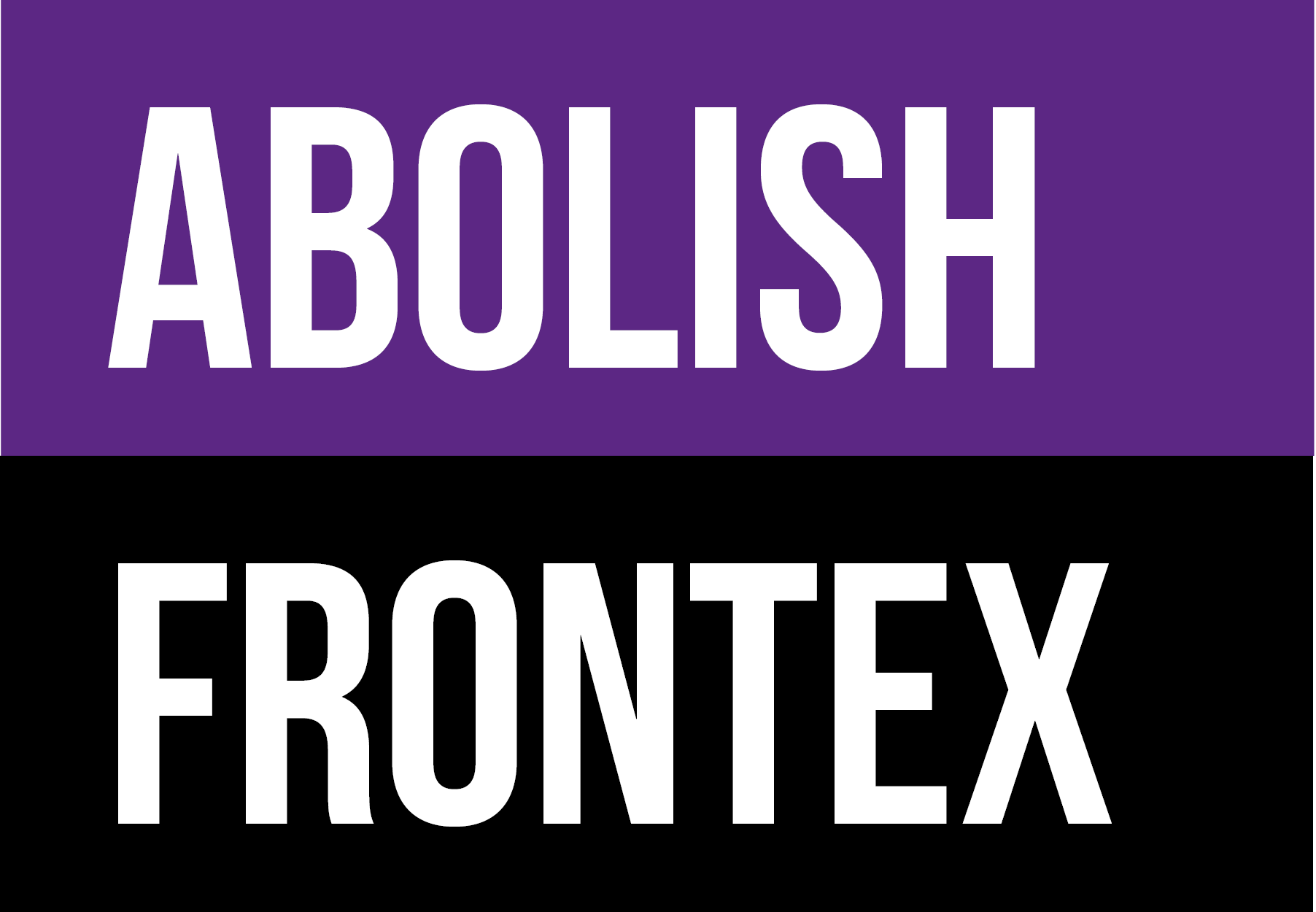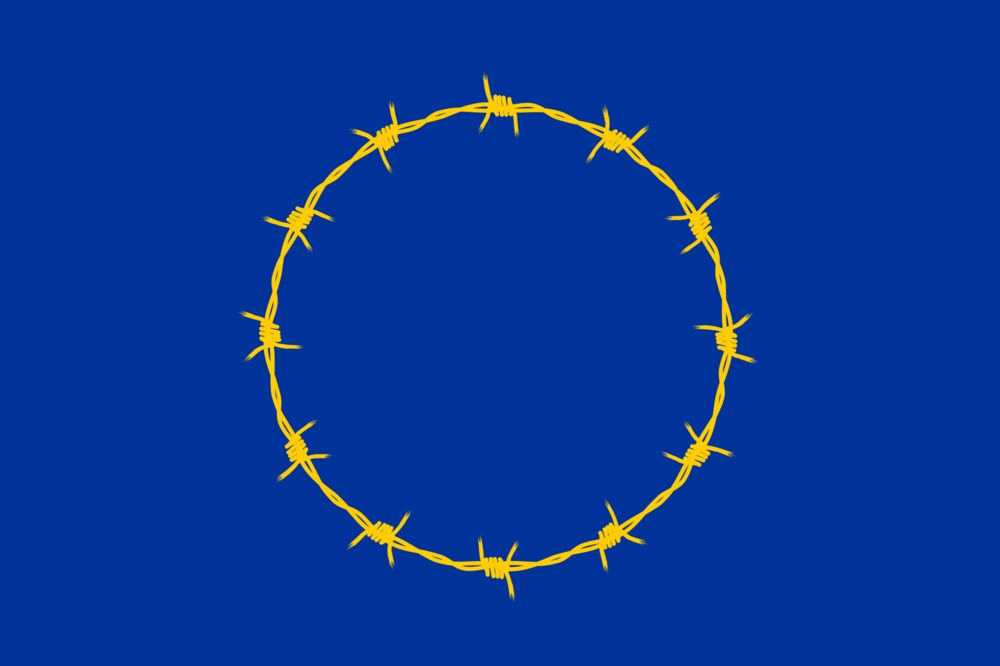 6 March 2023 – Abolish Frontex, a grassroots network of over 130 groups and organisations aiming to abolish the EU border guard agency and to end the EU border regime, releases the following statement regarding the recent deaths of people on the move, the Italian government clampdown on rescue ships and its reaction to the shipwreck disaster. Continue reading “‘A programmed disaster: Crotone (Calabria – Italy)’ – statement about the current developments in Italy”
6 March 2023 – Abolish Frontex, a grassroots network of over 130 groups and organisations aiming to abolish the EU border guard agency and to end the EU border regime, releases the following statement regarding the recent deaths of people on the move, the Italian government clampdown on rescue ships and its reaction to the shipwreck disaster. Continue reading “‘A programmed disaster: Crotone (Calabria – Italy)’ – statement about the current developments in Italy”
CommemorAction 6 February 2023: MIGRATION IS A RIGHT!
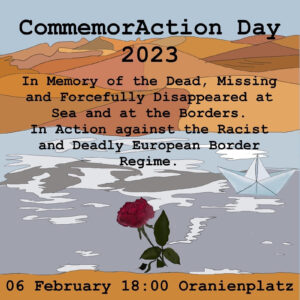 A Global Day of Struggle against the regime of death at our borders and to demand truth, justice and reparations for migration victims and their families.
A Global Day of Struggle against the regime of death at our borders and to demand truth, justice and reparations for migration victims and their families.
“CommemorAction” is a double promise: We will not forget those who have lost their lives and we will fight against the borders that killed them. Continue reading “CommemorAction 6 February 2023: MIGRATION IS A RIGHT!”
The EU’s Nobel Peace Prize 10 years on: Project Failed!
Call to Geneva – Sit-in on 9 and 10 December 2022 to support ‘Refugees in Libya’
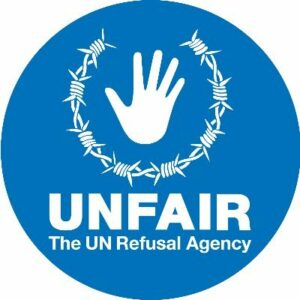 9 November 2022 – One year ago, thousands of refugees had been protesting for more than 100 days in front of the UNHCR office in Tripoli: an historical act of self-organisation under the harshest conditions. Instead of listening and improving, UNHCR criticised their protest, ignored their voices, and remained silent in light of the brutal eviction and detention of those claiming their fundamental rights. Despite ongoing repressions and threats, the demands of “Refugees in Libya” prevail and their struggles continue in various different forms.
9 November 2022 – One year ago, thousands of refugees had been protesting for more than 100 days in front of the UNHCR office in Tripoli: an historical act of self-organisation under the harshest conditions. Instead of listening and improving, UNHCR criticised their protest, ignored their voices, and remained silent in light of the brutal eviction and detention of those claiming their fundamental rights. Despite ongoing repressions and threats, the demands of “Refugees in Libya” prevail and their struggles continue in various different forms.
To support “Refugees in Libya” in their fight and to amplify the voices of all those who keep getting ignored, punished, and unfairly treated by an agency that is supposed to protect them, we call for two days of action in front of the UNHCR headquarters in Geneva, Switzerland on the 9th and 10th of December 2022.
Switzerland: Borders over Climate

6 November 2022 – While being one of the richest countries in the world, Switzerland’s contribution to climate financing – a major topic at the ongoing COP27 in Egypt – is only modest, not to say shamefully small. In light of how Switzerland profits from extractivist practices that are a major cause for climate change and climate affected displacement, taking into account that the country hosts some of the major financers of these practices, Switzerland’s role is clear: with a border militarisation budget at least 33% higher than its current climate finance spending, it pays more to shut borders, build walls and support a deadly migration regime than to support the countries and communities most affected by climate change with counteracting measures.
Read the factsheet by the Abolish Frontex Research Group
Photo report action day ‘Stop Italy – Libya Memorandum’
On 15 October an international action day ‘Stop Italy – Libya Memorandum’ was organized by Abolish Frontex, Diritto di migrare-diritto di restare and Solidarity with Refugees in Libya. In many cities in- and outside Italy people took to the streets to demand that the Italian government puts an end to the illegal and shameful Memorandum on migration cooperation. Outside of Italy most protests were held in front of Italian embassies and consulates.
 Berlin Berlin |
|
Bern 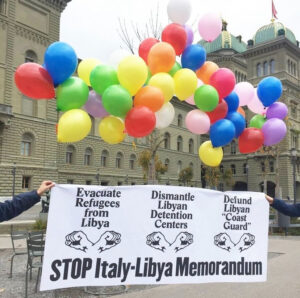 |
Brussels 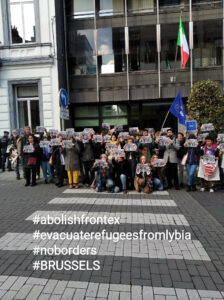 |
Guernica  |
Messina  |
Madrid  |
|
Milan 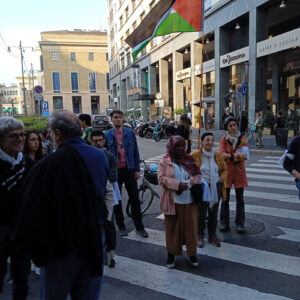 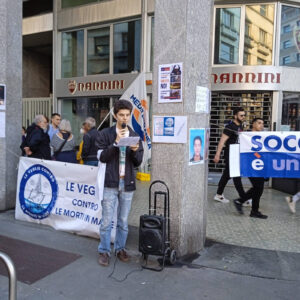 |
|
Napels   |
|
Paris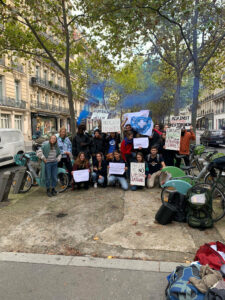 |
Rome  |
Rome (19 October)   |
|
Ravenna 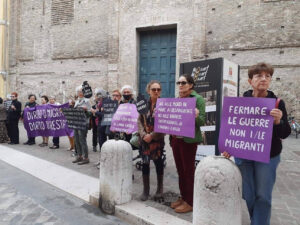 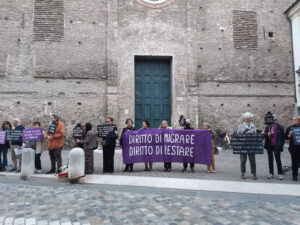 |
|
Schio  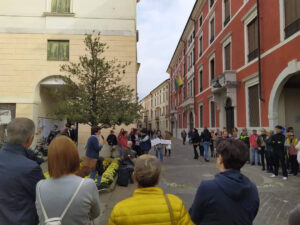 |
|
Zürich 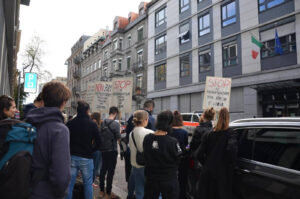 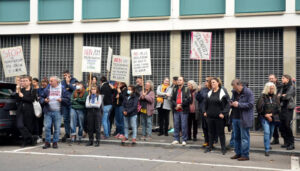 |
|
Rotterdam hosts Frontex conference on virtual wall
 On 18 and 19 October 2022 the Royal Marechaussee, the Dutch military police, will host a Conference on the Entry/Exit System in the Maritime Domain for EU border guard agency Frontex in Rotterdam. The conference will bring Frontex staff, staff of border and port authorities from EU member states and representatives from selected companies and cruise-ship associations together to discuss the implementation of the Entry/Exit System (EES), a biometrics based database, at maritime border crossing points. The EES is part of a network of (biometrics) databases, with the aim to create a ‘virtual wall’ to keep or get migrants out of the EU. These virtual walls connect with the whole system of border walls, border militarisation, border externalisation, detention and deportations the EU has deployed in building Fortress Europe. It is also another profit opportunity for the military and security industry.
On 18 and 19 October 2022 the Royal Marechaussee, the Dutch military police, will host a Conference on the Entry/Exit System in the Maritime Domain for EU border guard agency Frontex in Rotterdam. The conference will bring Frontex staff, staff of border and port authorities from EU member states and representatives from selected companies and cruise-ship associations together to discuss the implementation of the Entry/Exit System (EES), a biometrics based database, at maritime border crossing points. The EES is part of a network of (biometrics) databases, with the aim to create a ‘virtual wall’ to keep or get migrants out of the EU. These virtual walls connect with the whole system of border walls, border militarisation, border externalisation, detention and deportations the EU has deployed in building Fortress Europe. It is also another profit opportunity for the military and security industry.
15 October: International Action Day ‘Stop Italy – Libya Memorandum’
 10 October 2022 – International action day organized by Abolish Frontex, Diritto di migrare-diritto di restare and Solidarity with Refugees in Libya.
10 October 2022 – International action day organized by Abolish Frontex, Diritto di migrare-diritto di restare and Solidarity with Refugees in Libya.
Barcelona, Berlin, Bern, Brussels, London, Madrid, Milan, Naples, Rome, Zurich and many other cities will take to the streets and demand that the Italian government puts an end to this illegal and shameful Memorandum. Outside of Italy, the protests will be held in front of Italian Embassies and Consulates. You can find a list of all the actions below. Continue reading “15 October: International Action Day ‘Stop Italy – Libya Memorandum’”
29/30 October: Anti-Frontex-Days in Berlin
 6 October 2022 – On the 29th and 30th of October we, Abolish Frontex, invite you to the Anti-Frontex-Days in Berlin, at Siegfried Hirschmann Park 1 by Ostkreuz. These days will offer a space for workshops, networking and strategy meetings, discussing the different aspects of the EU border regime for activists, various groups and people interested in anti-racist and no-border activism in Berlin and beyond. We want to offer a place for exchange and mutual support. One struggle, one fight!
6 October 2022 – On the 29th and 30th of October we, Abolish Frontex, invite you to the Anti-Frontex-Days in Berlin, at Siegfried Hirschmann Park 1 by Ostkreuz. These days will offer a space for workshops, networking and strategy meetings, discussing the different aspects of the EU border regime for activists, various groups and people interested in anti-racist and no-border activism in Berlin and beyond. We want to offer a place for exchange and mutual support. One struggle, one fight!
Different workshops on topics such as deportations, resistance, racism, self-organization, different aspects of the EU border regime, and the violent role of Frontex, will be held. A detailed program will be announced soon. To close off the weekend, we want to invite you to an activist picknick on Sunday afternoon to spend nice relaxed moments together.
Snacks and dinner by Kiezkantine on Saturday evening will be provided. We can provide translations during the workshops – please reach out to us by email and specify which language(s) would be needed. Please also feel free to reach out to info[at]abolishfrontex.org if you need any further information.
We are looking forward to a powerful weekend!
After watching his Friend Drown to Death, Refugee Takes New Frontex Director to Court Over Agency’s Operation in Greece
[Press release from front-LEX] 5 October 2022 – Today, the legal hub front-LEX has filed a case against Frontex’s new Executive Director Aija Kalnaja at the Court of Justice of the European Union. The legal non-profit argues that the EU Border and Coast Guard agency must terminate or suspend its joint operations with the Hellenic Coast Guard in the Aegean Sea Region due to countless horrific human rights abuses related to these operations.
The case, to be financed by a crowdfunding campaign, was filed on behalf of J.K., a Congolese refugee. He is one of 43,000 children, women and men who entered Greece to seek asylum but instead were violently abducted, forcibly transferred to ‘death rafts’, collectively expulsed and abandoned in distress at sea. J.K. was a victim of multiple such attempted murders, lastly on 14 July 2022. During one of them he had to watch his friend drown to death, with European officers watching, laughing, doing nothing to save him, and not even recovering his body.
Read the whole press release: in English – in German
